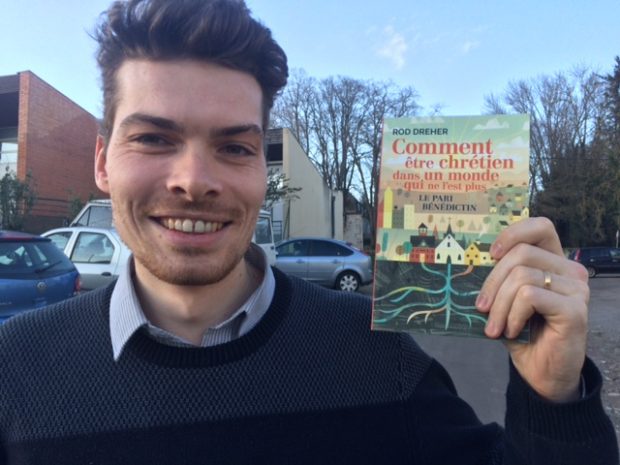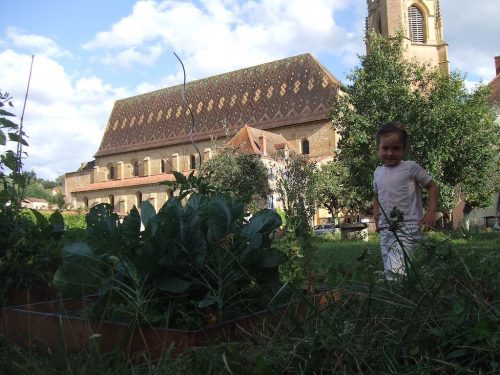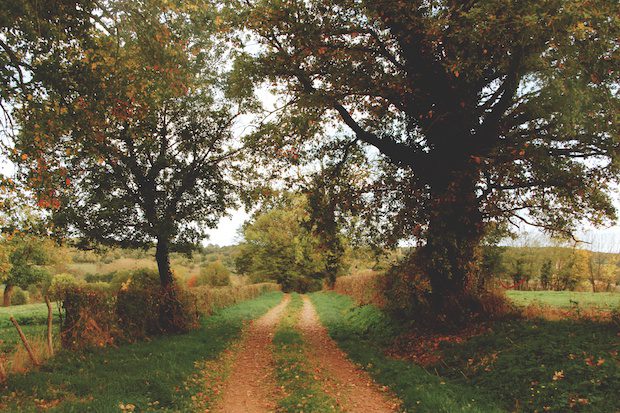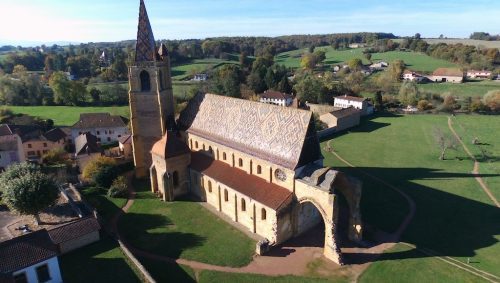News From Real-Life Benedict Options


A year and a half ago, when I spoke at the annual Journées Paysannes conference in France — the JPs are a national association of French Catholic agrarians — I met a young man named François Nollé. He and his wife Blandine lived with a handful of other laity to settle into La Bénisson-Dieu (Blessed By God), an “eco-hamlet,” or small settlement, in which the residents lived out their faith, and in particular, the teachings of Pope Francis in his ecological encyclical Laudato Si. The idea is to build a community of prayer, education, and service integrated more holistically into the local environment. The local ordinary, the Bishop of Lyon, granted them permission to take over the remains of a 12th century abbey, and build an experimental faith community there in the countryside northwest of Lyon. “We are now 10 homes on the site, about 15 adults and about 30 children,” François says. And they have opened a school for the kids.
Here’s my interview with François Nollé.
RD: How did Le Bénisson-Dieu get started?
FN: At the origin of our project, there are three families. My wife and I knew the other two families for a long time, but they did not know each other. The path towards the foundation of a Christian eco-hamlet was different for each family.
For me, it goes back a long way: I can say that my parents were anti-conformist, and at the same time profoundly Catholic. They did not belong to a well-defined environment, and went beyond the right-left, conservative-progressive cleavage; that made me interpret the world without some bias and a priori. In addition, my mother also fed and cared for me according to Hildegarde of Bingen’s medicine, raising my attention to nature and how to respect her. After my re-conversion through charismatic Catholic movements, and during my studies, I gave up this lifestyle received during my childhood, adopting the lifestyle of the consumer and individualistic society, which rebounded on the way I practiced my Catholic faith.
A determinant event, allowing a deepening of my re-conversion, was my marriage with Blandine in 2011 and the wait for our first child. My wife then fell very ill, with a cyst in the throat filled with water and fat like an orange. The allopathic doctors told us that they could do nothing before childbirth, the puncture of the cyst being impossible. But Blandine clearly could not give birth in her feverish state of constant fatigue. We had then, on a council of friends, to turn to naturopathic medicines, and went to see, full of suspicion, an iridologist (method of diagnosis via the iris) and chromatherapist (method of care through colored lights projected on certain areas of the skin).
We thought we were dealing with a charlatan, but were forced to reconsider by our experience. This doctor diagnosed a bowel and circulatory problem due to, among other things, cow’s milk intolerance, and advised Blandine to change her diet. After the chromatherapy session, the cyst resolved itself in two weeks. What impressed us was the fact that this doctor did not seek first to eliminate the symptoms of the disease, but that he sought the cause; and that he took into account for that the totality of the human person. We did not change the diet immediately, and the cyst came back. A second effective session of chromatherapy sounded the death knell of our old way of life.
We began by modifying our diet, putting into practice the advices of Hildegarde of Bingen, for ourselves, and also for our children. Blandine then followed a naturopathic training for two years, to learn how to treat us more naturally. And so, little by little, we gradually changed the whole of our habits and our way of life: the way of dressing, the household and cosmetic products we used, the way of educating and teaching our children, the political life and the spiritual life that we practiced. In short, we asked each aspect of our way of life to find out what consequences, beneficial or harmful, they could have on ourselves, others, nature, and our relationship to God. We then felt a strong need for coherence, which we did not find in Paris, where we lived.
It was then that in 2015, we discovered the existence, via the movement of the Colibris initiated for 40 years by Pierre Rahbi (a non-Christian philosopher farmer who made emerge the ecological movement in the civil society), of eco-villages that sought to re-found society from below, and in which ecology was both human and environmental. We took a free training course they offered to help found “oasis”, as they call it: communal and ecological living spaces in the middle of the individualist and capitalist desert. We thought it was great, but church in the center of these eco-villages was lacking. At the same time, the encyclical Laudato Si was published by Pope Francis, and allowed us to unify all our research by the idea of integral ecology, which means that, by analogy, all aspects of a way of life are interrelated. The conjunction of the discovery of eco-villages and the publication of the encyclical gave us the impetus to found what we call a Christian eco-hamlet, which is a kind of synthesis between the initiatives of the Colibris and the integral ecology of Pope Francis.
In parallel with our path, two friendly families experienced similar things, from a bodily point of view (various diseases), political and intellectual (the great marches against “marriage for all” in France, and the intense reflections that followed) and spiritual (their marriage). These various events have gradually made them change paradigms and ways of life. We gathered at Christmas 2015 to give birth to a common charter, and sent it to all the bishops of France, to propose to them to set up this church project in their diocese. We have received many favorable, encouraging answers, and suggestions of places to settle.
We chose La Bénisson-Dieu, a small village in the heart of France, close to the Sacred Heart of Jesus (Paray-le-Monial), and whose name alone is an evangelical program. “La Bénisson-Dieu”, the name of our village, means literally “Blessed be God” or “Blessed by God”. It’s built around an old Cistercian monastery, the “Blessing of God” abbey, founded by Saint Bernard in 1138, of which there remains only the church; the rest was destroyed after the French Revolution. The diocese of Lyon owns four houses in the village, which will be used, when they are renovated in an ecological way, as homes for people in difficulty. We did not want to found a project by isolating ourselves totally from society, but we wanted to integrate an already existing village to revitalize it from the inside. We have been living in the village since August 2016, having bought houses there, and since then, other families and friends have joined us to live with us. Everyone has found a job in the area, while keeping time for the life of this small Cistercian ecological family community.

When you say that you and your wife Blandine were seeking more “coherence” than you found in Paris, what do you mean?
In Paris, we felt that we could not make our different lifestyles cohere.
First, we felt too much distance between our urban way of life and the contact with nature we were looking for; in large cities, there are too many intermediaries between man and nature. And the urban jungle is no more livable than the Amazon jungle; especially for our children. We had to return to something more balanced, which for us was the village of a few hundred inhabitants, where nature and culture can interact in a more harmonious way.
Secondly, we experienced a break between the Sunday Mass and the rest of the week: we had the impression that our Sunday celebrations were totally abstract and uncorrelated to what we lived every day, and that the parish community had a community only in name. We aspired to find a true Christian community, which supports itself on a daily basis, and for which Sunday Mass would be the recapitulation of all that has been lived together during the week.
These two points required to start from scratch, to rebuild a village and parish community that corresponds to our aspirations. And that’s what we’re trying to experience now with the other nine homes in our eco-hamlet!

What is a typical day like in your community?
I will describe a typical week rather than a typical day at La Bénisson-Dieu. Every morning, at 6:30 am, those who can meet for a time of Eucharist adoration, then for Lauds at 7 am. Then, from Monday to Friday, those who work outside the village go about their business. At 8:15 am, the schoolchildren leave by horse-drawn cart for the school we opened last September, which is located in the nearby village, three kilometres from La Bénisson-Dieu. Some of us give one afternoon a week to teach lessons to the schoolchildren at the school, in addition to the teacher who takes care of it full-time.

Once a week, mothers meet to pray and reflect together on their children’s education. On Friday mornings, those who heat with wood go to the forest to cut wood. On Saturday afternoons, we organize participatory workshops at each other’s homes. On Saturday evenings, we meet for a worship vigil or a game night. On Sunday midday, we often have a shared meal together; then we pray Vespers at 5:30 pm.
Every two weeks, we meet for a village council, in order to take together the decisions that concern us all. In addition to that, there are all the unorganized moments when we help the old neighbor whose tree collapsed on her henhouse, when we look after the children of a family that is sick, or a couple that needs to meet in pairs, when we share the harvest from our gardens, when we can fruits and vegetables together for the winter. In short, a normal village life!

What advice would you give to people who are interested in doing something like La Bénnison Dieu in their own lives? What are the conceptual barriers within themselves that they have to overcome? What are the practical ones?
To change your lifestyle, the most necessary quality is patience: it is impossible to change all your habits at once, and you will encounter many disappointments. But it is worth it.
I think that the most difficult conceptual barrier to overcome is the fear of living in community. It is easy to see the disadvantages and possible abuses, especially with the abuses of authority and sexual abuse that have taken place in the new “charismatic” communities. But on the other hand, we do not see the disadvantages and excesses of the individualistic and consumerist society. And once you have tasted the kindness of being able to provide services between neighbors, of being able to have a good time every day, of being able to count on each other, of being able to spontaneously share meals, believe me, you can no longer do without them. We try to protect ourselves against the excesses of new communities by not pooling finances, and by preserving the intimacy and autonomy of each family; but at the same time we reject contemporary individualism, which prevents people from developing ties of dependence between themselves, which is what they are meant to do, however!
The most difficult practical barrier to overcome is, in my opinion, the fear of losing one’s material, psychological and spiritual comfort. However, here again, we only see the disadvantages of a simpler and more sober life, and we do not see all the advantages. My current life allows me to practice the Christian virtues much more than any prayer group I have ever attended in the big cities!
There is also a form of spirituality that is a great obstacle to life change, and that consists in thinking that the spiritual life is totally independent of the life we lead every day. For example, we think it is quite possible and compatible to work in a company that commits social and environmental crimes while being Catholic: what matters is to pray and go to Mass, and so spirituality is totally detached from concrete life; but who does not see that going to Mass while making the world less good is not compatible? Our religion is the only religion of the incarnation; what we do every day is fundamental in God’s plan of salvation. It is the whole social doctrine of the Church that must be rediscovered and put into practice in order to achieve true coherence in our spirituality.
In talking to people about the Benedict Option, I find that some people say that the Benedict Option cannot work unless everybody can do the same thing. Not everybody can move to a small French village and live in community with other families (they say); therefore, the Benedict Option is unrealistic. What do you say to that?
It is for this reason that I like the legend of the Hummingbird, which I remind for those who do not know it: there was a forest fire in the Amazon, and the animals of the jungle watched, appalled, their living environment was choked by smoke — except for a small hummingbird, which was struggling to go back and forth between the river and the blaze, to deposit his little drop of water there. The other animals began to mock him by telling him that what he was doing was useless. The hummingbird answered: “Yes, but I am doing my part.” After that, all the animals started to work, and put out the fire together.
Of course, things will only really change when the majority of us change; but that is no excuse not to start; because what will make others change is you, who through your change of lifestyle, will attract and inspire others to do the same. Change from below is transmitted as a virus, and must function as an epidemic.
Moreover, the quantity paradigm is not necessarily the best indicator: saints are far from being the majority in the world, and yet they are the ones who transform the world the most, in an invisible way. We must follow their example, renouncing the idea that we are to be the savior of the world (there is a certain Jesus who has already assumed this role), and doing things to our measure, locally.

We must be aware that a change in lifestyle is possible everywhere, even (and especially!) in the city (although it is more difficult in the city, in my opinion). In France, there are eco-hamlets, eco-villages, eco-neighborhoods, as diverse and varied as the people who launched these projects. The basis of such a project is obviously the fact of finding a simpler, more sober, and more convivial life. The most difficult thing is to find other people with whom to live this conversion; because the issue is first and foremost a community one, and not just about environmental performance. Nine out of 10 projects fail because of what is called the “human factor”. Finding a strong and balanced group is much more difficult than finding a place or money for projects. It is possible for you to experience what we are experiencing where you are, but it requires so many changes in habits, and such resistance to the pressure of the surrounding society, that sometimes the simplest thing is to leave and recreate something from scratch elsewhere.
Finally, there are several ways to change things; I see three main ways: from below, from the middle, or from above. From below, it is all the small human communities that are formed to make a difference locally, to their full potential. From the middle, it is, for example, companies that can make a difference in the way they interact with their suppliers and customers; or journalists or artists, who have a broader influence than just local. From above, it is the politicians who enact the laws that will have an impact on the whole chain. None of these three ways of changing things is superior to the other; it is simply up to each person to discern to which of the three they feel called (it is possible to act at all three levels!).
What kind of life do you foresee for your children as they grow into adulthood?
It is tempting to think that, as the world gets worse and worse, my children will live in a world even worse than mine; there will probably be even more violence, moral disorder, ignorance, political mistakes. But I’m not sure that’s the right way to look at it.
I am part of a generation that has received little from the generation of its parents. We know how to do nothing with our hands, we are left to ourselves, desiring transhumanism because we are diminished beings. That’s why we took it in hand, with friends, to launch this eco-hamlet: to rediscover a lost conviviality, to learn to do things with our hands again.
But the transition is so long and costly that I tend to think that, like Moses, we will not see the promised land. We will walk in the desert for 40 years; what motivates us is precisely to know that our children may see the promised land. By rebuilding a real village life, by passing on to them know-how and deep knowledge, a healthy lifestyle and an incarnate spirituality, we hope to enable them to live in a more livable world than ours.
Each generation must live its life as if it were going to live the end of the world, and at the same time as if humanity still had a thousand years ahead of it; it is a tension that is present in the very Gospel. Evil takes different forms, and is to be fought in each generation. Our children will not escape it, but we will have tried to give them the weapons to face this mission in the most serene way possible.
How can Christians in the US and elsewhere contact you to find out more about your project?
Our email address is: ecohameaubenissondieu -at – lilo.org
You can write to us in English.
We also opened a website on a Christian crowdfunding site: https://www.credofunding.fr/en/ecole-laudato-si-benisson-dieu
The English page describes our different projects, and gives a particular focus on the school we have opened. It is possible to support us by making a donation. Thank you very much!
[end of interview]
Isn’t that marvelous? I strongly encourage any American Christians interested in doing something like this, or the agrarian life more generally to go to the Journées Paysannes annual meeting, on Feb 16-17, 2020.
It’s in the village of Souvigny, which is not far from La Bénisson-Dieu. Sounds like a trip. I went two years ago, and let me tell you, it’s an occasion of great joy, meeting real French farmers and food artisans who live in the countryside, and who are serious about their faith.
In other news from Benedict Option communities, I heard this week from some Polish friends. There’s going to be a Benedict Option event in Warsaw in a couple of weeks:

I also received an e-mail from Father Włodzimierz Zatorski, a Benedictine monk at Poland’s Tyniec abbey, not far from Krakow. He has a dream of establishing a Benedict Option intentional community for laity and at least two priests to serve their spiritual needs. Father Wlodzimierz wrote to say that on November 22, they legally established the Foundation Opcja Benedykta (the Benedict Option Foundation). Now they can raise money to make it happen. They will be searching for a place. Father Wlodzimierz and I had a long conversation about how concerned he is about the future of spiritual life in Poland. This project he imagines will be an initiative to meet the challenges of the current moment. I’ll tell you more about it when I hear from him — and how you readers interested in building a Ben Op community in Poland can help.
Finally, I have a new video from my old friends the Tipi Loschi, the glorious Italian Catholic community on the shores of the Adriatic. I wrote about them and their charismatic leader, Marco Sermarini, in The Benedict Option. They are the most ideal example of a lay Ben Op community I have yet to see. It’s full of children, and light, and life, and joy. And it’s growing so big that they need help expanding. They’ve just created this video. When you watch it, make sure you have the subtitles on:
These are the dearest people to me. Please help if you can. Here’s a donate page, but if you want to ask questions first, write to them at scuolachesterton — at — mail.com.
So many great Benedict Option things happening in the world now. I know another superb initiative underway in Italy, but it’s still not public yet. Just wait! If you have anything going on that the rest of us should know about, give us a shout.
Subscribe for as little as $5/mo to start commenting on Rod’s blog.